Aval upma recipe with step by step photos. Aval Upma also known as Poha upma is one more easy to make tasty breakfast recipe with poha or flattened rice, veggies, onions, cashews, herbs and spices. The recipe gets done in just 30 minutes and makes for a quick breakfast or tea time snack.
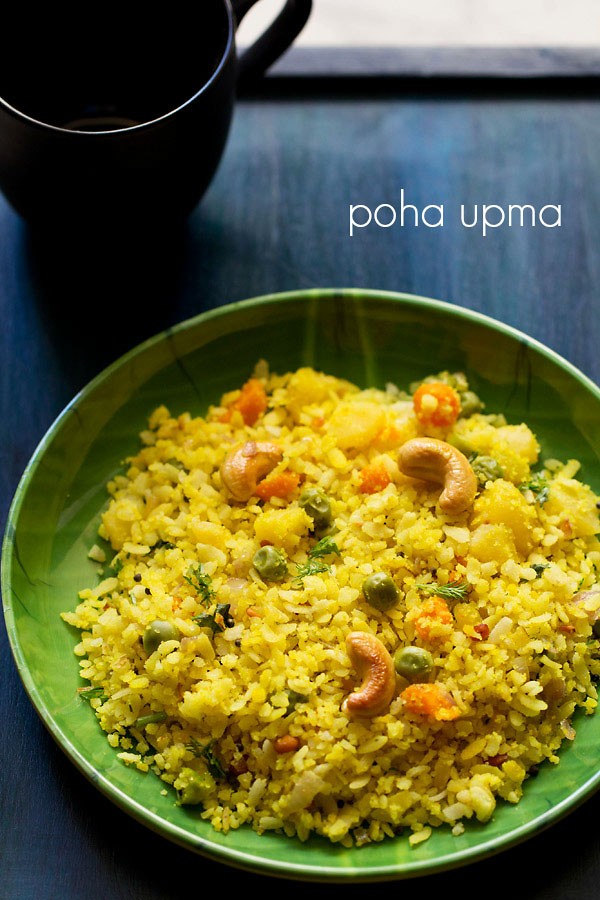
Both Upma and Poha are one of the regular breakfast at home. They are quick to prepare and healthy too. The poha upma recipe is actually a variation of South Indian upma made with poha.
I do add veggies at times and sometimes skip them. You can steam the veggies first and then add them. Or cook the veggies along with the tempering and then add the poha. Choose whatever is easy for you.
If cooking the veggies with the tempering, then you need to add some water. Cover the pan and cook the veggies. Once the veggies are cooked, simmer till the moisture dries up before you add the poha.
To make this poha upma gluten free, skip adding the asafoetida or use gluten-free asafoetida.
Serve vegetable poha upma with your morning tea or coffee. This quick dish can also be served as an evening snack.
How to make Aval Upma
1. You will need to steam veggies if you plan to add them. I used 1 potato, 1 carrot and some peas. Once steamed, peel and chop the potato and carrot and keep aside.
You can also cook the veggies directly with the tempering in the pan. You can even skip the veggies, if you prefer.
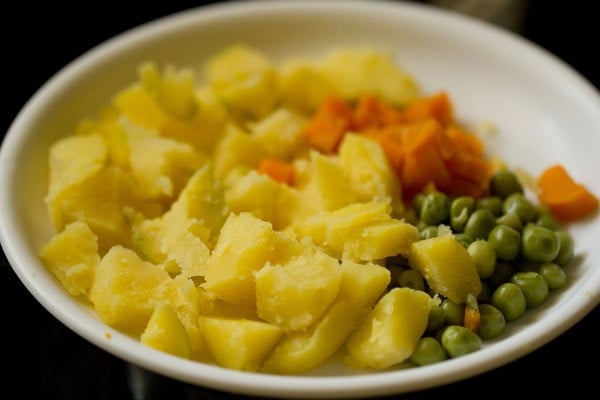
2. Rinse 2 cups thick poha in water in a colander or strainer for a couple of times. Move the poha with your hands while rinsing. The poha just needs to get softened. So rinse gently.
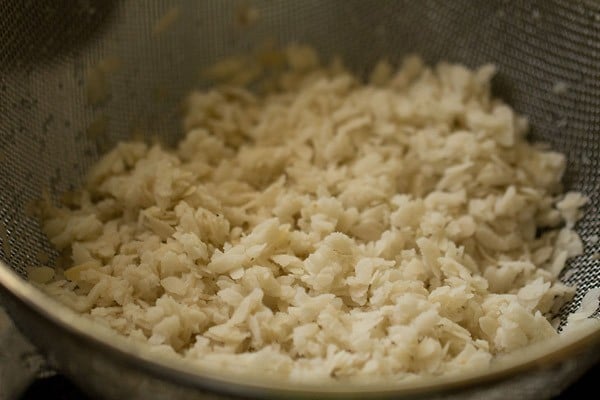
3. Add ½ teaspoon turmeric powder, ½ teaspoon sugar and salt as required to the poha.
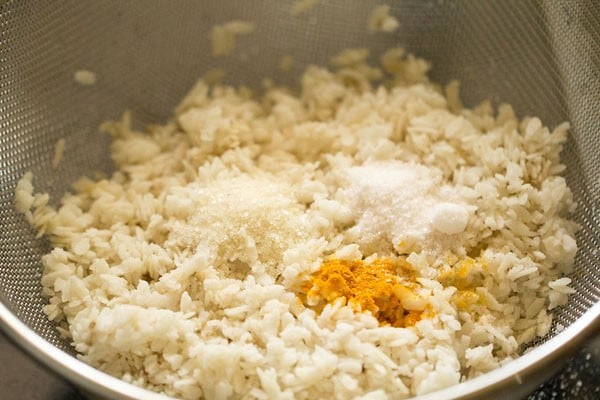
4. Mix gently. Keep aside.
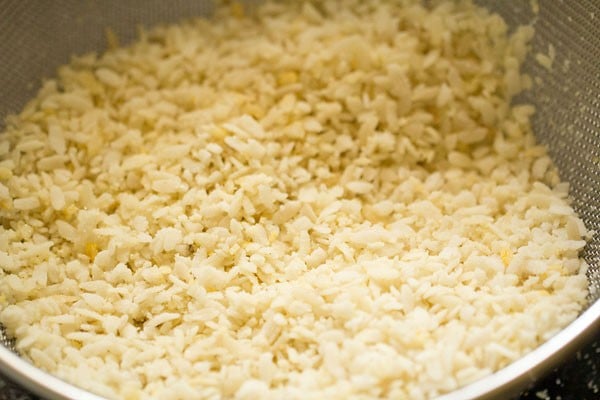
Making tempering
5. In a pan, heat 2 tablespoons oil and add 1 teaspoon of mustard seeds.
You can use any neutral-flavored oil.
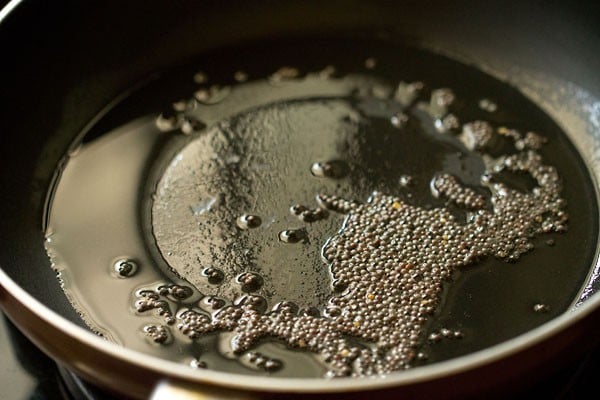
6. When the mustard seeds crackle, add 1 teaspoon chana dal (optional), 1 teaspoon urad dal (optional) and 10 to 12 cashews.
TIP 1: You can also add 1 tablespoon of peanuts instead of cashews.
TIP 2: If you have time, then I recommend to soak both the lentils in hot water for 20 to 30 minutes. After 20 to 30 minutes, drain all the water and then add the lentills for tempering at this step.
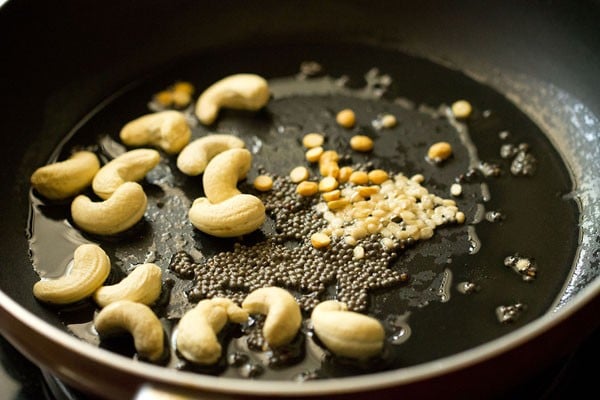
7. Stir and saute till both the dals and cashews turn golden.
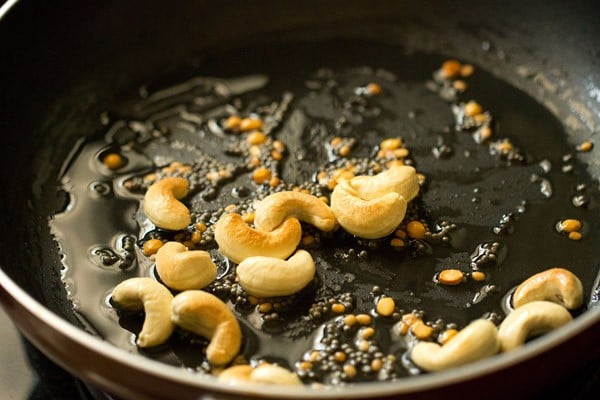
8. Now add the following ingredients:
- ⅓ cup finely chopped onion
- 1 teaspoon finely chopped ginger
- 1 teaspoon chopped green chilies
- 1 dry red chili
- 8 to 10 curry leaves
- a pinch of asafoetida (optional).
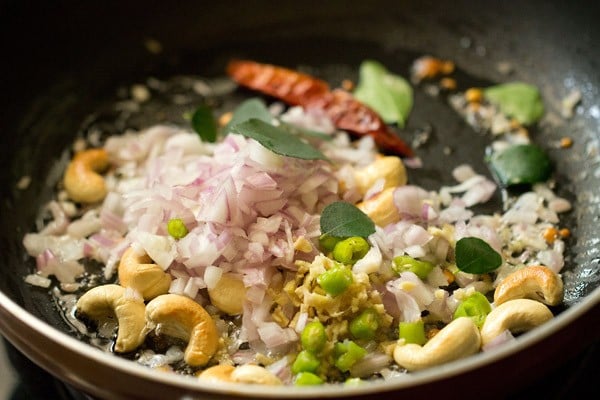
10. Stir and saute till the onions turn translucent.
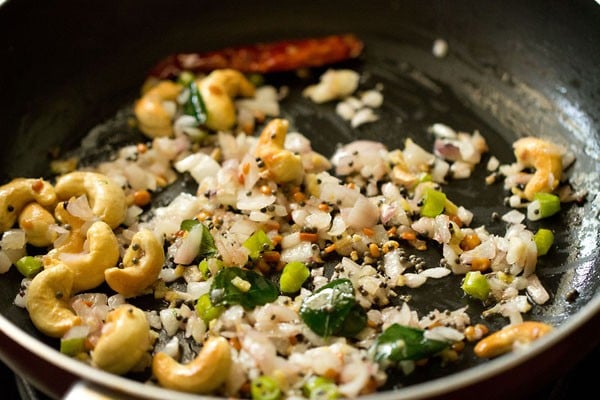
Making Aval Upma
11. Add the veggies.
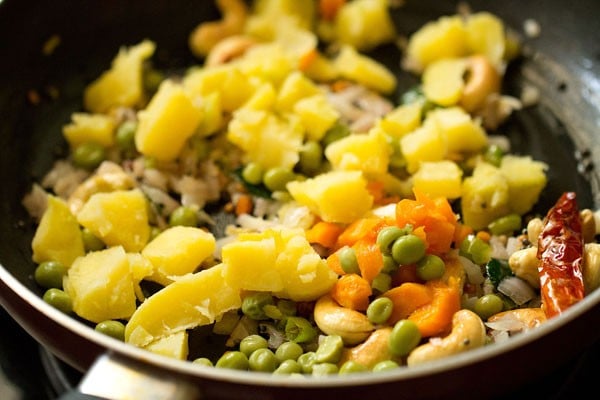
12. Stir very well.
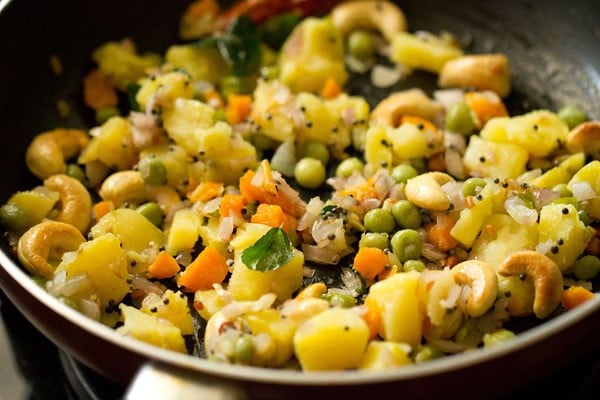
13. Then add the poha.
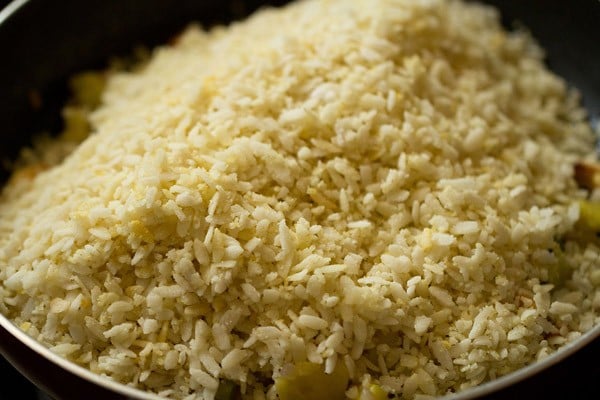
14. Stir and mix gently. Check the taste and add more salt or sugar if required.
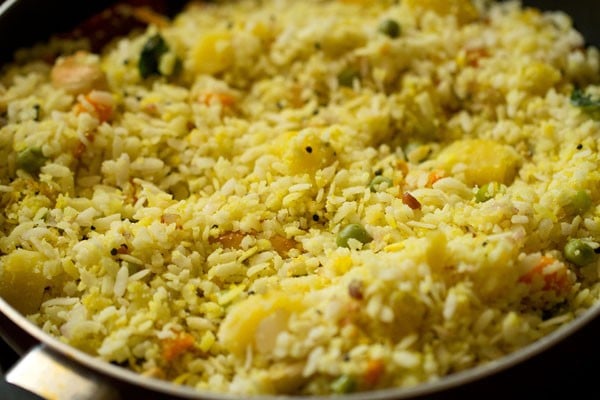
15. Ensure that everything gets mixed evenly and cook on a low heat for 3 to 4 minutes. After mixing you can also cover the pan and allow the poha upma to steam for 3 to 4 minutes on a low heat.
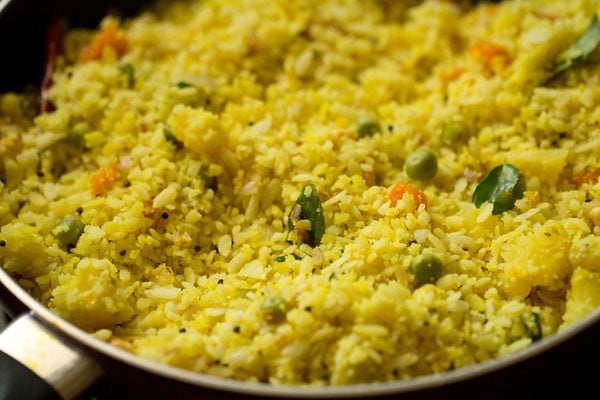
16. Lastly add 2 to 3 tablespoons of chopped coriander leaves and mix gently. You can also add 2 to 3 tablespoons of grated coconut at this step.
You can also drizzle some lime or lemon juice and mix. Or serve the aval upma with lime slices.
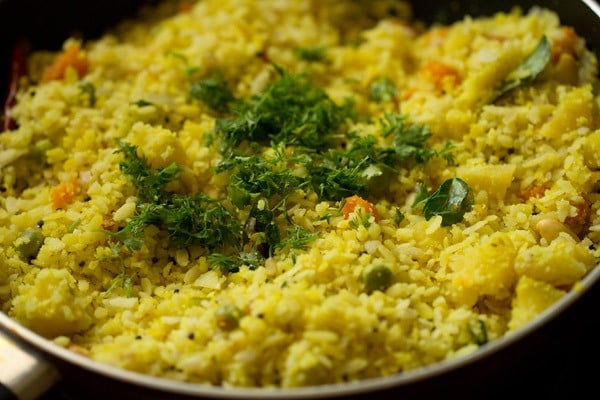
17. Serve aval upma hot or warm with lemon or lime slices or a lemon pickle.
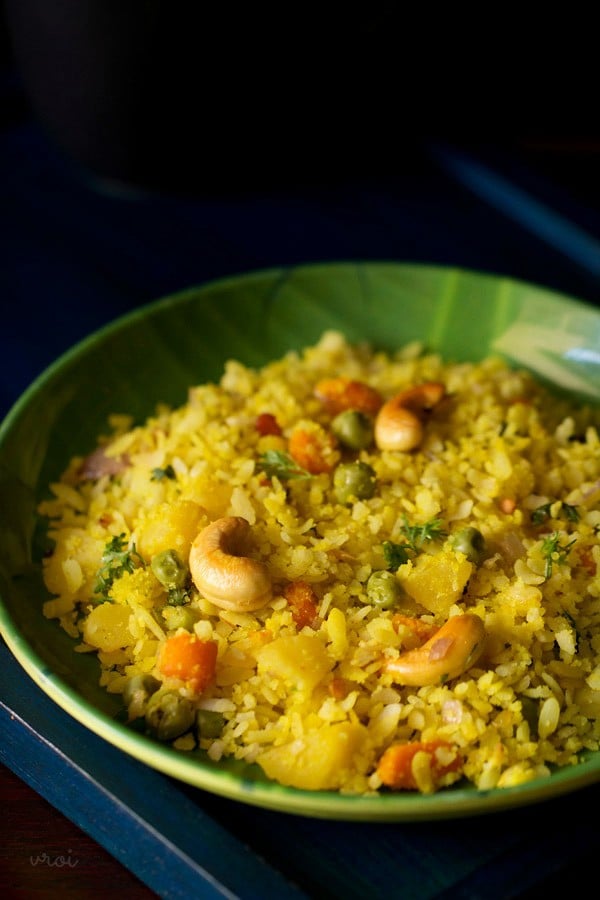
If you are looking for more Aval recipes then do check:
Please be sure to rate the recipe in the recipe card or leave a comment below if you have made it. For more vegetarian inspirations, Sign Up for my emails or follow me on Instagram, Youtube, Facebook, Pinterest or Twitter.
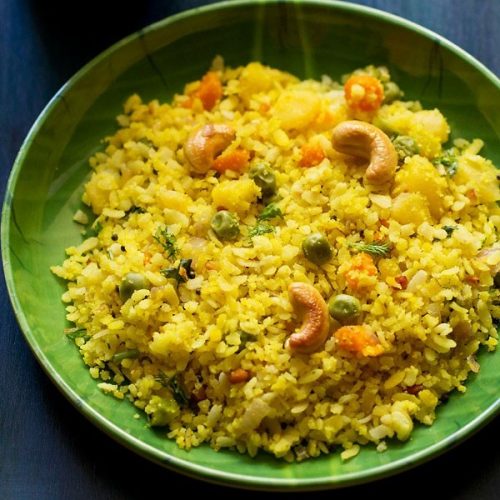
Aval Upma | Poha Upma
Ingredients
prep ingredients for aval upma
- 2 cups thick poha (parched rice or flattened rice)
- ½ teaspoon turmeric powder
- ½ teaspoon sugar or add as per taste
- salt as required
veggies
- 1 medium potato
- 1 small to medium carrot
- 1/3 cup green peas – fresh or frozen
tempering and other ingredients
- 2 tablespoon oil
- 1 teaspoon mustard seeds
- 1 teaspoon chana dal (split husked bengal gram)
- 1 teaspoon urad dal (split husked black gram)
- 10 to 12 cashews or 1 tablespoon peanuts
- 1 dried red chili
- 1 or 2 green chilies – chopped
- ½ inch ginger – finely chopped
- 8 to 10 curry leaves
- 1 pinch asafoetida (hing)
- 1 medium onion, finely chopped or 1/3 cup finely chopped onion
- 2 tablespoon grated coconut (optional)
- 2 to 3 tablespoon chopped coriander leaves
- 1 small lime or lemon for serving
Instructions
prepping veggies
- You will need to steam veggies if you plan to add them. I used 1 potato, 1 carrot and some peas.
- Once steamed, peel and chop the potato and carrot and keep aside. You can also cook the veggies directly with the tempering in the pan. You can even skip the veggies.
prepping poha
- Rinse 1 cup thick poha in water in a colander or strainer for a couple of times. The poha just need to get softened. So rinse gently.
- Add 1/2 tsp turmeric powder, sugar and salt to the poha.
- Mix gently. Keep aside.
tempering and making poha upma
- In a pan, heat 2 tbsp oil and add 1 tsp mustard seeds.
- When the mustard seeds crackle, add 1 tsp chana dal (optional), 1 tsp urad dal (optional) and 10 to 12 cashews. You can also add peanuts instead of cashews.
- Stir and saute till both the dals and cashews turn golden.
- Now add 1/3 cup finely chopped onion, 1 tsp finely chopped ginger, 1 tsp chopped green chilies, 1 dry red chili, 8 to 10 curry leaves and a pinch of asafoetida (optional).
- Stir and saute till the onions turn translucent.
- Add the veggies and stir very well.
- Then add the poha. Stir and mix gently. Check the taste and add more salt or sugar if required.
- Ensure that everything gets mixed evenly and cook on a low flame for 3 to 4 minutes. After mixing you can also cover the pan and allow the upma to steam for 3 to 4 minutes on a low flame.
- Lastly add 2 to 3 tbsp chopped coriander leaves and mix gently.
- You can also add 2 to 3 tbsp grated coconut at this step. You can also drizzle some lime or lemon juice and mix. Or serve the poha upma with lime slices.
- Serve poha upma hot or warm with lemon or lime slices or a lemon pickle.
Notes
- The addition of vegetables is optional.
This Aval Upma post from the blog archives first published on May 2015 has been updated and republished on January 2023.








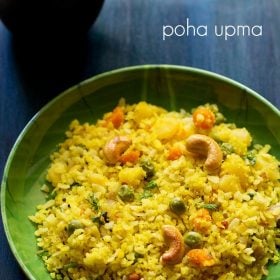
I am an American who loves cooking authentic Indian food. Your recipes are instructive and easy to follow. Thank you!
Thanks a lot Jennifer and glad to read your feedback. Most welcome and happy cooking.